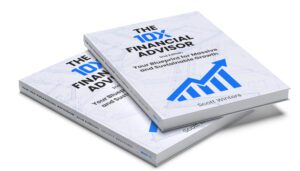Here’s something I’ve learned from raising six kids: no matter how smart technology gets, it’s never going to handle the emotional side of parenting. Trust me—I’ve asked Siri how to soothe a crying teenager at midnight, and her best advice was, “Here’s what I found on the web.” Not exactly comforting in a crisis.
As financial advisors, we’re facing a similar crossroads. Robo-advisors and AI-driven platforms can analyze portfolios, generate projections, and handle transactional tasks with remarkable efficiency. But ask any automated system to reassure a panicked investor during a sudden market drop, and you’ll quickly discover its limitations. Emotional intelligence—your ability to empathize, reassure, and genuinely connect—is your new superpower.
The problem, however, is that many advisors are still relying solely on technical expertise. Sure, charts and spreadsheets are valuable tools, but they don’t build loyalty or create trust in isolation. With the relentless rise of AI, technical skills alone won’t prevent commoditization. Clients aren’t just looking for a good return—they’re looking for someone who genuinely cares about their financial well-being and emotional peace of mind.
Think about it. When the market plunges overnight or the headlines scream “economic crisis,” clients aren’t seeking cold numbers—they’re craving reassurance, clarity, and genuine human connection. Technology can’t hold their hand through tough decisions, sense their anxiety, or provide empathy-driven guidance. That’s your job, and it’s more important now than ever before.
So, what’s the solution? Double down on your emotional intelligence. Develop a deep understanding of your clients’ fears, hopes, and dreams. Practice active listening—truly hear them. Reflect their feelings back to them. Be proactive, anticipate their emotional responses, and communicate with compassion and clarity. Invest in training your entire team to read emotional cues and understand client psychology. Make emotional connection the core of your service.
Here’s what’s in it for you as an advisor: deepening your emotional intelligence builds an irreplaceable “moat” around your practice. It creates loyalty, inspires referrals, and enhances client satisfaction in ways that AI and algorithms simply can’t. Your ability to emotionally connect ensures clients see you as irreplaceable, not just a portfolio manager, but as their trusted confidant.
In a world relentlessly chasing efficiency, your humanity isn’t a weakness—it’s your unfair competitive advantage. Embrace empathy, and you’ll not only outperform AI—you’ll earn the enduring loyalty of clients who know they have someone in their corner, not just someone in their inbox.
If your edge as an advisor is your empathy, then your most valuable asset is time spent with clients. But how much of your week is consumed by tasks a machine could handle? When your day is filled with admin work, compliance checklists, and inbox triage, you’re not building relationships—you’re just managing transactions.
That’s why the next leap in your practice isn’t just about doing more—it’s about freeing yourself to do what only a human advisor can do: listen deeply, offer perspective, and be present for life’s biggest financial and emotional moments.
At Financial Gravity, we help you automate the noise so you can amplify the connection. Our Done-For-You advisor support model gives you the systems, staffing, and strategic leverage to step back from the operational chaos and step fully into your role as a trusted guide.
Let us handle the processes, so you can be fully present at the kitchen table, not just behind the dashboard.
More time. More trust. More loyalty. That’s how you outperform AI—and build a practice that lasts. Ready to reconnect with your clients and re-center your value? Let’s make it happen.
At Financial Gravity, we believe your greatest asset isn’t your algorithms—it’s your empathy. That’s why our Turnkey Multi-Family Office Charter is built to remove the operational noise that gets in the way of real connection. We equip you with the systems, staffing, and structure to offload what’s automatable—so you can focus on what’s irreplaceable. If you’re ready to spend less time in your inbox and more time building trust at the kitchen table, let’s talk. We’ll show you how our model helps advisors outperform AI by being more human than ever.




















